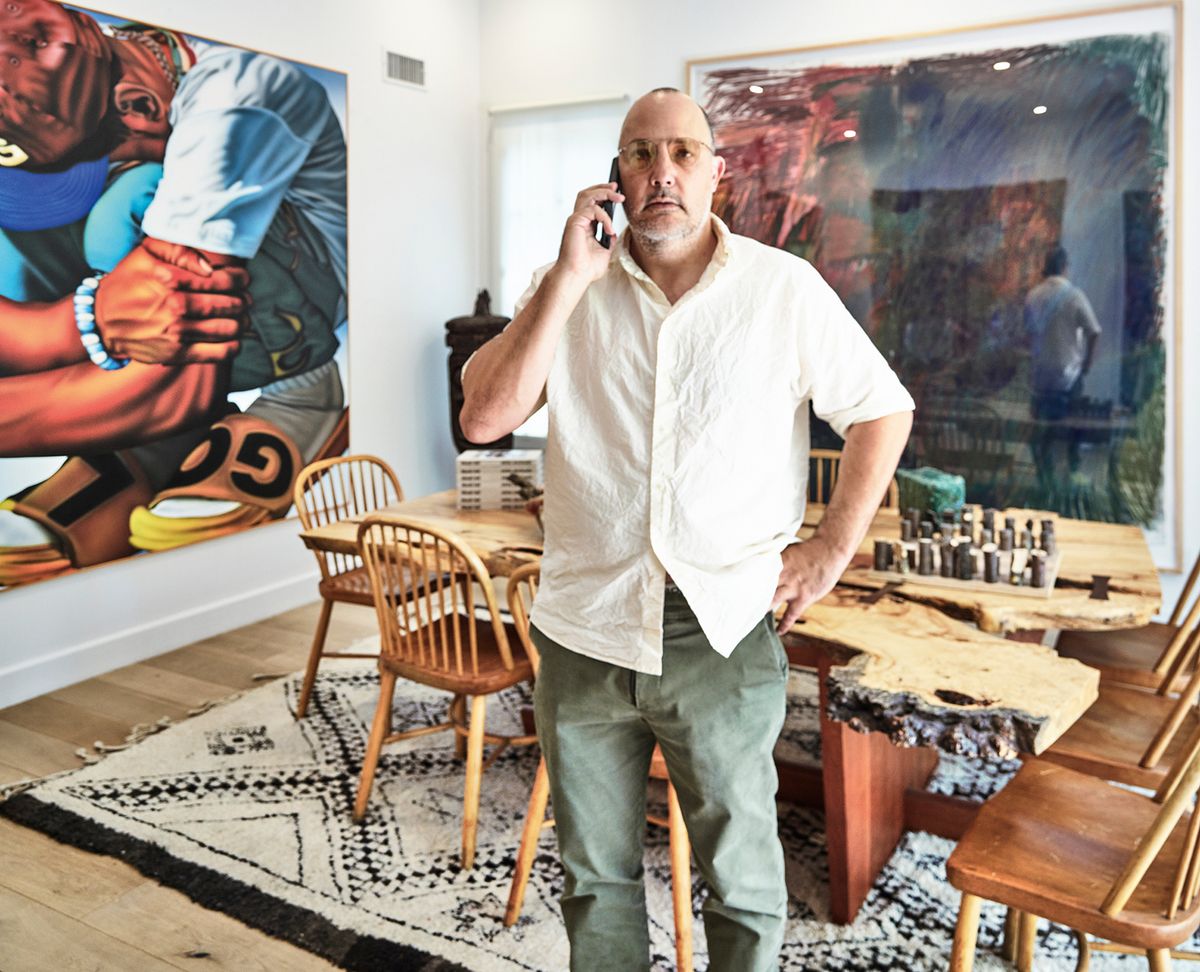The art dealer and collector Stefan Simchowitz announced in November that he is running for the US Senate in the election that will determine the successor to Dianne Feinstein, the longtime California Democrat who died in September. Simchowitz, who was born in South Africa and is now based in Los Angeles—where his contemporary art dealings, via the Simchowitz Gallery and beyond, earned him the title of “The Art World’s Patron Satan” in a 2014 New York Times Magazine profile—is one of 15 Republican candidates vying for the seat within a field of more than three dozen hopefuls.
Despite a stylish website chock-full of platform information and photos of Simchowitz posing jauntily in a cowboy hat, he has no illusions about his chances of winning against high-profile Democratic candidates such as US Representatives Katie Porter, Barbara Lee and Adam Schiff. “I want to introduce a new centrist way of thinking, which I have no chance of doing within the Democratic Party because it’s such a tightly organised machine,” he says. “I’m a Don Quixote character. I’m running to basically build a platform that I believe is correct and fair. I’m calling it the New Republican Agenda, which I’ll shorten to NRA, which is kind of funny.”
Simchowitz, who is Jewish, says his decision to run was cemented on 7 October while watching news of the Hamas attack on Israel unfold and witnessing—in his view—a widespread lack of support for Israel and the Jewish community. “I never liked Netanyahu,” he says. “I’m not even an AIPAC [American Israel Public Affairs Committee] fan. But I am a Zionist, and I know it’s a nasty word. I believe in a Jewish state in peace with a Palestinian state in a two-state solution.”
I speak to friends who lose their jobs and can’t find a place to live. I speak to friends who can’t afford health insurance. I see fear and terror economicallyStefan Simchowitz
Simchowitz’s political aspirations have been further inflamed by the failures of government and society that he routinely witnesses. “Every day I drive around Los Angeles and I see homeless people,” he says. “I speak to friends who lose their jobs and can’t find a place to live. I speak to friends who can’t afford health insurance. I see fear and terror economically. I see young people in their 20s not having fun or dating, and sharing rooms with five other people. It’s totally dehumanising, and it’s not the country that I moved to.”
One of the key issues of his platform is homelessness, which has reached a crisis point in California’s cities. He does not believe that states have the financial resources or legal capabilities to tackle the problem, so he wants to federalise it. He favourably cites one of Donald Trump’s post-term ideas to bring in the military to construct facilities complete with latrines, tents and medical services, camps to which Trump suggested the government displace thousands of unhoused people while banning encampments.
The foremost goal of Simchowitz’s campaign, however, is to promulgate his economic ideas, specifically modern monetary theory, which purports that governments should disregard fears of accumulating debt and continue to print money liberally until the population reaches full employment. To combat inflation, the theory goes, the government would have to reduce the amount of money in circulation by raising taxes. But, he argues, inflation is caused by many factors and there are other ways to temper it. “We want to change the regressive tax act that hedge-fund managers and private equities get when they get a 20% carried interest rate on the trillions of dollars that they manage,” he says.
“High interest rates are basically universal basic income for people with money, which is bullshit and causes the working class to suffer. It causes radical inequality and it causes a poverty of education. It’s truly dangerous.”
Optimising opportunities
By focusing on economic policies he believes will reduce inequality, Simchowitz says he wants to promote equality of opportunity. This may partly explain the lack of information about his positions on civil rights issues on his website. “Fundamentally, once you solve [economic inequality], you don’t need to focus on framing everything in terms of man versus woman, black versus white, straight versus gay or trans, Muslim versus Christian,” he says. “You don’t have to order inequality in a hierarchy of inequalities. We need to focus on issues that will actually make a difference and not alienate people, like housing.”
Simchowitz recognises that his art-world peers might not take his political ambitions seriously, but he is undeterred. His status in the art industry as a disruptive figure has left him feeling misunderstood, he says, but he hopes his ideas will percolate in society in the same way that art gains a foothold in the cultural consciousness.
“I don’t have a single lobbyist’s number in my phone,” he says. “I’m not trying to raise money from rich people. As a senator, you’ve got to think about raising money half the time, which is not good for the country. If people want to donate money based on my Instagram posts [about the campaign], I’ll take it and I’ll use it to print some T-shirts when I lose. But in life, the only way to win is to lose.”


